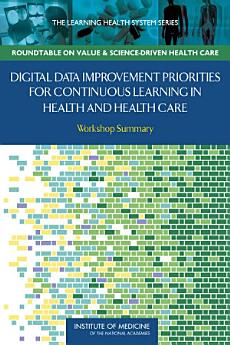Digital Data Improvement Priorities for Continuous Learning in Health and Health Care: Workshop Summary
About this ebook
The ability to collect, share, and use digital health data is rapidly evolving. Increasing adoption of electronic health records (EHRs) is being driven by the implementation of the Health Information Technology for Economic and Clinical Health (HITECH) Act, which pays hospitals and individuals incentives if they can demonstrate that they use basic EHRs in 2011. Only a third had access to the basic features necessary to leverage this information for improvement, such as the ability to view laboratory results, maintain problem lists, or manage prescription ordering.
In addition to increased data collection, more organizations are sharing digital health data. Data collected to meet federal reporting requirements or for administrative purposes are becoming more accessible. Efforts such as Health.Data.gov provide access to government datasets for the development of insights and software applications with the goal of improving health. Within the private sector, at least one pharmaceutical company is actively exploring release of some of its clinical trial data for research by others. Digital Data Improvement Priorities for Continuous Learning in Health and Health Care: Workshop Summary summarizes discussions at the March 2012 Institute of Medicine (2012) workshop to identify and characterize the current deficiencies in the reliability, availability, and usability of digital health data and consider strategies, priorities, and responsibilities to address such deficiencies.






